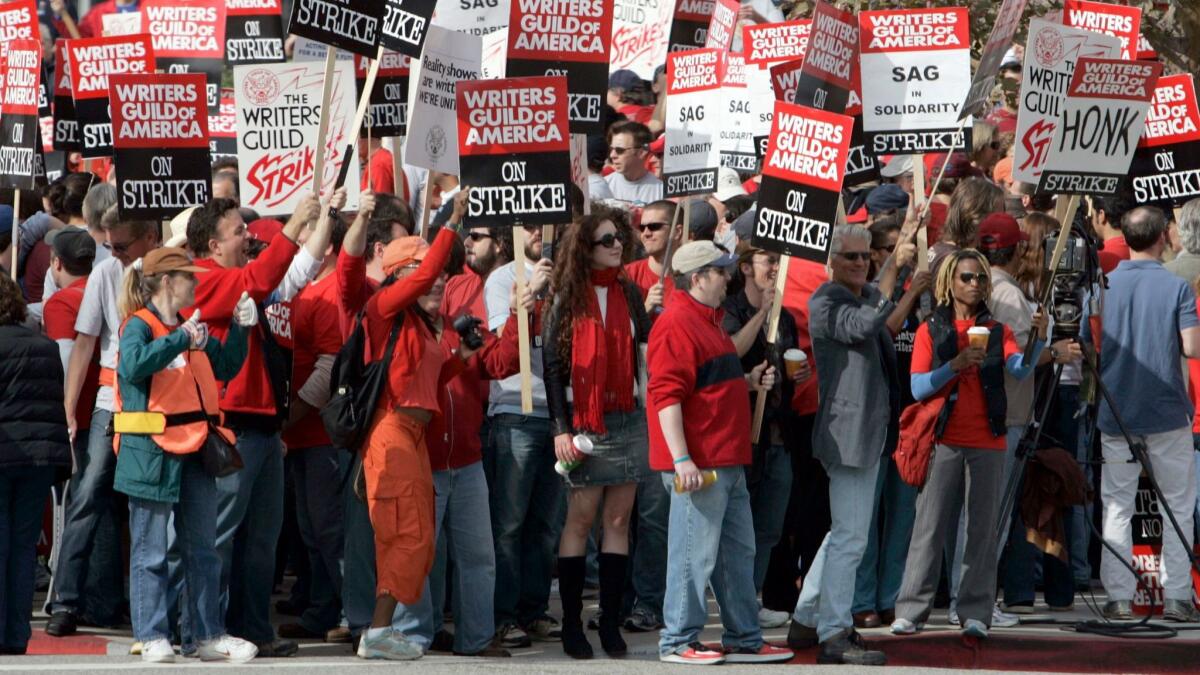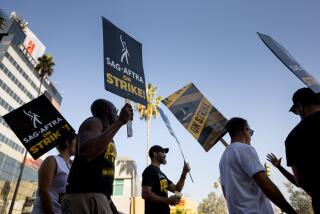Writers Guild of America contract talks stall, move Hollywood closer to a possible strike

Members of the Writers Guild of America scripted themselves a classic Hollywood nail-biter in their contract negotiations with the major studios.
Talks between the two sides stalled late Monday as the countdown clock approached the midnight deadline without any announcement about a deal.
It appeared likely that the guild would move to extend the deadline by 24 hours so that discussions with the studios could continue.
While the writers and the studios seemed to have made some progress over the weekend on several issues, including the guild’s healthcare plan, writers had not responded to the studio’s latest offer by well past noon Monday, according to sources familiar with the discussions who weren’t authorized to talk to the media.
The mood within the guild turned grim as optimism gave way to trepidation over the growing possibility of a strike that would have a far-reaching effect across Hollywood.
The two sides could avert a strike if they mutually agree to extend the deadline. A federal negotiator could also be called in if the discussions deteriorate further.
A mediator was brought in during the 2007 negotiations but the move failed to stop a walkout by writers. The strike lasted 100 days and resulted in numerous TV productions shutting down.
The guild, which has about 13,000 members, is negotiating with the Alliance of Motion Picture and Television Producers, the body that represents the major Hollywood studios and networks. Both sides have been unable to comment because of their media blackout.
On Sunday, the alliance increased its offer on the guild’s employer-funded health plan, which faces mounting deficits, according to one source. The studios also improved their offers on other sticking points, such as boosting pay for writers who have been affected by the trend toward shorter TV seasons.
Writers have complained that shorter seasons have negatively affected their livelihoods since many are contractually prohibited from working on more than one series per season. The trend has also affected the health plan because studios contribute a percentage of writers’ gross compensation to the fund.
Despite the concessions, however, the sides remained at odds late Monday over other issues, including on the guild’s demand for pay parity across different platforms, such as cable and streaming.
Since negotiations began in March, the two sides have broken off talks twice. The guild’s membership voted in favor of a strike authorization April 24.
A strike would have the most immediately effect on late-night comedy shows such as “Conan” on TBS and “The Tonight Show Starring Jimmy Fallon” on NBC. These daily programs depend on writers to script topical jokes based on the day’s headlines.
Shows currently shooting could also bear some of the brunt of a strike since writers are often called to revise scenes in the midst of production. Series including “NCIS: Los Angeles” on NBC, “Better Things” on FX and “Ray Donovan” on Showtime are currently shooting around the L.A. area.
Streaming series on Netflix and Amazon would be less affected because their release dates aren’t as strictly controlled as traditional TV. But Netflix has stated that some of its shows would be affected by a strike.
Movie production would be less affected than TV, but screenwriters would not be able to revise scenes or dialogue for films that are shooting during the strike.
A prolonged strike would have widespread economic effects throughout the L.A. area as it hits businesses tied to the industry. Technical crews — often referred to as “below-the-line” talent — would also experience a financial hit since they are largely dependent on local TV production.
A strike could mean a greater shift toward reality TV programming. Despite the name, reality TV often employs writers to devise scenarios for the shows. But many reality writers aren’t members of the WGA.
The longest strike in the guild’s history was in 1988, when writers walked off the job for 155 days.
More to Read
Inside the business of entertainment
The Wide Shot brings you news, analysis and insights on everything from streaming wars to production — and what it all means for the future.
You may occasionally receive promotional content from the Los Angeles Times.







